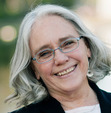Edith Maxwell's Blog, page 225
August 22, 2016
Leaping with Faith
Edith north of Boston – but packing to be south of Philadelphia on retreat for a week starting tomorrow.
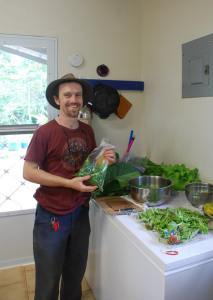
JD with greens he grew
The title of this post does not mean I’m going jumping with my seventeen year old Quaker character. Rather, I was thinking about taking leaps of faith, as we call it. My younger son JD is back (on a one-way ticket) from a couple of years working and teaching at Plenitud Puerto Rico, a fabulous permaculture educational farm, and he’s investigating starting a branch of same in New England. It’s a big leap of faith, and I have no doubt he’s going to pull it off.
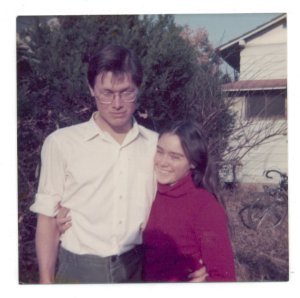
With camera-shy Tim Ottman, Minami Rinkan, Japan, 1976
I’ve taken a few major leaps of faith in my own life. When I was just twenty-three, I bought a one-way ticket to Japan. I’d been pining for my boyfriend, who was stationed in the US Navy outside Tokyo. So off I went. We lived in a simple little house off base, I found a job teaching English conversation to Japanese businessmen, and I lined up private Japanese lessons. It was a great two years of learning and travel, and I came back to start a linguistics PhD program in Indiana.
Another big risky jump I took was leaving a very good job in high tech to stay home with my newborn and toddler sons, start a small farm, and teach prepared childbirth classes, a family decision I made with my husband. Babies
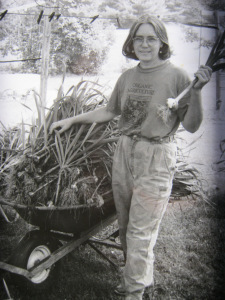
Farmer Edith and part of the garlic crop, Five Star Organic Farm, 1993
are young for such a short period of time in the overall scheme of our lives, and I didn’t want to miss it. Organic farming had been a passion of mine for a while, so I got to explore that, too. Those five years have now given me two mystery series worth of material – farming and midwifery – too!
The most recent leap off a cliff was quitting another very good job in hi tech. After almost twenty years as a software technical writer (what I retrained as after I left farming), three years ago I cut my five-year plan short by four years and plunged into full-time fiction writing. Financially it would have been prudent for me to keep the good salary, the 401k matching, and the benefits for a few more years. I didn’t have a husband with a cushy salary to fill in the gaps (my beau is talented and hardworking, but he’s self-employed) and I still don’t have what some say is the requisite amount in the bank required before retirement (but who does, really?). On the other hand, I’d landed the Local Foods Mysteries contract, and I was writing the books around the edges of a full-time job with an hour commute each way and no allowance to work from home. I was exhausted and frustrated.
When a dear friend died in her fifties a year after a brain cancer diagnosis, I said, “That’s it. I’m following my dream.” I gave notice, signed up for Affordable Care Act health services, and here I am, writing three series under contract with major publishers.
Your mileage will vary, of course, and past performance does guarantee future…oh, heck. I’d take those three leaps again, any time.
Readers, how about you? Have you taken a major risk in your life? Plunged into a new full-time gig without an adequate safety net?
Filed under: Edith's posts Tagged: Leaps of faith, local foods mysteries, Minami Rinkan, organic farming, Plenitud Puerto Rico, US Navy

August 19, 2016
Opening Lines
It’s Opening Lines day! Today’s pic: What’s in your trash can? Thanks to Siobhan Geraghty for the photo!

Photo Credit: Siobhan Geraghty
Sherry: This isn’t what I had in mind when they hired me to be a garbage man.
Jessie: Sally was done practicing on mannequins. It was time to apply her machete wielding skills to the real target.
Liz: My attempts at quietly sneaking up to the door were in vain when I tripped over the trashcan – and screamed when a head rolled out and landed at my feet.
Julie: I lost my head. Which was a real shame, since it looked so good on top of the dress form I was using for target practice. A lot like my ex-boyfriend, as a matter of fact.If only the dog hadn’t mistaken it for a soccer ball.
Barb:
August 18, 2016
Guest: Denise Swanson
Edith here, enjoying the fresh produce of summer. I met author Denise Swanson in Ann Arbor a couple of years ago. She has a cozy series with its nineteenth book coming out next month! I asked her to share how she got to where she is. Take it away, Denise.
Riding the Whirlwind
For most writers, getting their first book traditionally published is a long and arduous journey. Yes. There’s always that one lucky duck who hits the trifecta on her first submission—right editor, right story, right open spot on marketing plan. But for the rest of us, it takes a long time and a lot of tears to find an agent and a publishing house.
I had two hundred and seventy rejection slips from agents before I finally won the race. And even then, it took the agent who signed me eighteen months to find a publisher. Back  then, nearly twenty years ago, cozy mysteries were nowhere near as popular and since I wanted to set mine in the Midwest rather than the south, with a curvy sleuth who had an unusual profession, few editors wanted to take the chance on a book that didn’t fit the mold.
then, nearly twenty years ago, cozy mysteries were nowhere near as popular and since I wanted to set mine in the Midwest rather than the south, with a curvy sleuth who had an unusual profession, few editors wanted to take the chance on a book that didn’t fit the mold.
In fact, my editor at NAL/Signet/Penguin cautioned me that because my Scumble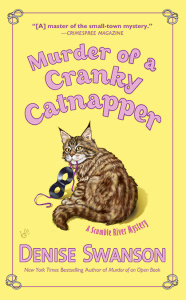 River series was a regional mystery that would only interest a limited audience mainly in the Midwest. With the first book in its fifteenth printing and the nineteen book, Murder of a Cranky Catnapper, due out September 6, I think she might have underestimated the small-town appeal.
River series was a regional mystery that would only interest a limited audience mainly in the Midwest. With the first book in its fifteenth printing and the nineteen book, Murder of a Cranky Catnapper, due out September 6, I think she might have underestimated the small-town appeal.
However, there are drawbacks to a long running series. Stagnation is always a risk. As an author, I have to make a concerted effort to allow my characters to change and grow. This means that Skye, my sleuth, has lost cars, houses, and boyfriends. She’s had to alter her goals, expectations, and how  she deals with her mother. And most of all, she’s had to mature from a woman who was running away from a life she didn’t want to someone who runs towards the life she does want.
she deals with her mother. And most of all, she’s had to mature from a woman who was running away from a life she didn’t want to someone who runs towards the life she does want.
Now that my heroine is married, I’ve been asked if I plan on ending the Scumble River series. But since I don’t think a woman’s journey end when she finds the man of her dreams, the answer is no. I think having a husband and children will push Skye into even more exciting adventures. Bring on book number twenty!
Readers: What do you like about long running series?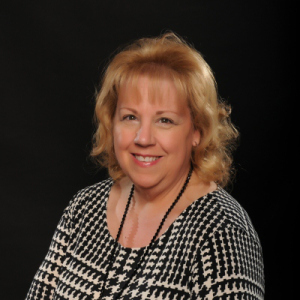
New York Times Bestselling author Denise Swanson writes the Scumble River and Devereaux’s Dime Store mysteries, as well as the Change of Heart contemporary romances. She lives in rural Illinois with her husband and big black cat. For more information, please visit her at DeniseSwanson.com. Or come hang with her at her Facebook group.
Filed under: Guest posts, Uncategorized Tagged: Denise Swanson, Midwestern mystery, Murder of a Cranky Catnapper, NAL/Signet/Penguin, Scumble River Mysteries

August 17, 2016
Wicked Wednesday: Mythbusters V–Write What You Know
 All young writers get the advice to “write what you know,” but let’s face it, if we all did that, there’d be way too many books about sitting on your a** typing words into a computer all day. As you’ve grown as a writer what has this advice come to mean to you?
All young writers get the advice to “write what you know,” but let’s face it, if we all did that, there’d be way too many books about sitting on your a** typing words into a computer all day. As you’ve grown as a writer what has this advice come to mean to you?
Julie: A work friend came into my office this week and said that she is loving Clock and Dagger, and knowing me makes it more fun. “How so?” I asked. “You’re in there. Like the colors they choose for the cards? Purple and green, just like StageSource.” She was right, of course. Part of me crept in, even when I didn’t mean for that to happen. But the whole “write what you know” should be “write what you can imagine.” You will ground things in your life, but I find a good google search and a long walk will free up my imagination to create what I didn’t know, but did imagine, would be a good story.
Sherry: Julie, one of the things that has so impressed me with your series is that no one would ever guess you didn’t know a lot about clocks until you started researching for the Clock Shop series. It’s a great example that you don’t have to write what you know. To me “write what you know” is also about what do you know that you don’t know you know. Right before I got the opportunity to write the garage sale series, I’d pitched my gemology series to our agent, John Talbot. He wasn’t interested in it but asked me what my hobbies were or what other things I knew about. After I stammered for a bit I finally said I liked to read. Then I slunk away. I would have never thought to mention I loved garage sales.
Edith: All of my series of course have bits of what I know, but what I love is widening what I know. I have some background in midwifery and in Quakers, but I had no idea of the depth and richness of my town’s history, or of the late 1800s and what a time of change it was. I absolutely love researching everyday life, political happenings, carriages, buildings, and attitudes of the era – and I didn’t know I would. Plus what Julie said, especially with my characters. Imagining how the mind of someone completely made up works, creating their motivations, following them around, writing down what they do – that’s the best.
Liz: I agree that a little bit of what you know informs everything you do, but there are so many opportunities to stretch. In the Pawsitively Organic series, I definitely know animals, but cooking is not my thing. So I have opportunities to learn all the time as I’m writing. Also, how many of us really know what it’s like to find bodies/investigate murders? Aside from the police-officers-turned-writers, probably not many of us. So we’re all researching, learning and stretching every day.
Barb: I think what this advice usually means is to write authentically. Make up people, but ground them in real and believable human emotions. Make up places, but give readers touchstones in those made-up places that help them believe they could be real. And give us imaginary plots and storylines–sometimes wildly imaginary–but do it in worlds with enough inner consistency that people are willing to go on the journey. Everything you have ever observed about the behavior of people, institutions, community, and place is relevant, and that is writing what you know. But then you can mix those up in wild and crazy ways, as long a you provide a foundation.
Jessie: I’ve always thought of this as an admonishment to to write the truth as you experience it. The plots and the details can vary wildly but to be a successful story, to resonate with readers, it should first strike a chord with the writer’s own truth. What do you value? What do you notice? What makes you angry or sad or elated ? That’s what you know. That’s what’s worth writing about for you.
Readers: What do you think? Can you tell when a writer is well-grounded in what they’re writing and when they’re making it up as they go along? Writers, do you or do you not, “write what you know?”
Save
Filed under: Mythbusters, Wicked Wednesday Tagged: garage sales, historical research, imagination, Quakers, write what you know, write what you want to research

August 16, 2016
The Detective’s Daughter – Hollywood Glamour
Good morning – we interrupt our regularly scheduled programming with a special announcement!
The winners of the Jess Lourey and Shannon Baker contests are:
Gail Arnold (Shannon’s winner)
Ann Mason (Jess’s winner)
Gail and Ann, message us your emails on the WCA Facebook page and we’ll put you in touch.
Now, over to Kim!

Kim in Baltimore melting from the intense heat.
A few months ago I read a book called Design for Dying by Renee Patrick which I highly recommend. I love reading about old Hollywood and show business, in fact I’m a bit obsessed with it. I blame my grandmother. She had subscriptions to Photoplay magazine and Rona Barrett’s Hollywood. We spent hours – and I do mean hours – flipping through the glossy pages covered with updates on everyone from Elizabeth Taylor to Paul Newman. While other girls on my block were dreaming of Robby Benson and Parker Stevenson, I was setting my alarm to get up at 3am to see a Robert Mitchum movie. The best nights were the ones where a Barbara Stanwyck film followed.
As much as I enjoyed the movies and magazines, what I really loved were 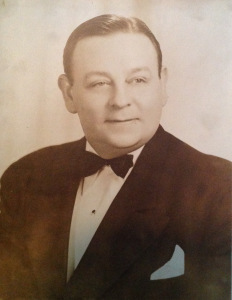 Nana’s stories of her older brother Al. Al was a bandleader who had his own club in the D. C. area in the 1940’s. I was fascinated with the photos of his orchestra and the many acts that had performed in his club. I could picture William Powell and Myrna Loy sipping martinis and watching as Fred Astaire and Ginger Rogers glided around the dance floor.
Nana’s stories of her older brother Al. Al was a bandleader who had his own club in the D. C. area in the 1940’s. I was fascinated with the photos of his orchestra and the many acts that had performed in his club. I could picture William Powell and Myrna Loy sipping martinis and watching as Fred Astaire and Ginger Rogers glided around the dance floor.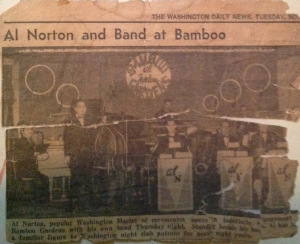
Just like all good Hollywood pictures, Al Norton’s life had a dramatic end. Nana told me many times how her brother, dejected by the woman he loved, died of a broken heart in his kitchen. Many years later I found a newspaper clipping about his death that revealed the truth; it wasn’t so much his broken heart that killed him as it was the gas on his stove he had purposefully turned on. Nana would never admit to that, but would tell me two notes were left. She burned hers after reading it.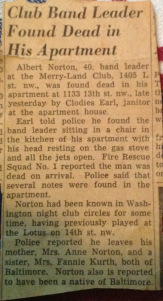
Though I never met this man, he has been a great influence on my life; from the books I read to the cocktails I drink. When I find a delightful book like Design for Dying or watch I Love Lucy reruns, I can’t help wishing to be sent back to that glamorous era.
Readers,
If you could be transported back in time, where would you want to go? Would you want to meet one of your ancestors or a famous historical figure?
Filed under: Kimberly Kurth Gray, Recommended Reads, The Detective's Daughter, Uncategorized Tagged: Al Norton, Balitmore City, Baltimore, Bamboo Room, bands, Barbara Stanwyck, big band era, Design for Dying, detective, Detectives daughter, Elizabeth Taylor, Fred Astaire, Ginger Rogers, Hollywood, Merryland Club, Myrna Loy, orchestra, Parker Stevenson, Paul Newman, Photoplay, Renee Patrick, Robby Benson, Robert Mitchum, Rona Barrett, Washington DC, William Powell

August 15, 2016
Tuning In
Jessie: In book jail on the coast of Maine.
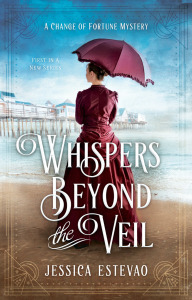 I have a confession. After having written five books I still don’t know where the stories come from. I don’t really mean the little snippets and nuggets of ideas that you tuck away and think “Oh, wouldn’t that be interesting to use in a book someday”. I mean the whole complex thing of starting with almost nothing and ending up with a whole world complete with complex people, vibrant settings and intriguing conflicts.
I have a confession. After having written five books I still don’t know where the stories come from. I don’t really mean the little snippets and nuggets of ideas that you tuck away and think “Oh, wouldn’t that be interesting to use in a book someday”. I mean the whole complex thing of starting with almost nothing and ending up with a whole world complete with complex people, vibrant settings and intriguing conflicts.
I wish I could say it had something to do with me but I am not really sure that it does. As I work I find myself wondering if my role is that of a conduit through which an existing story flows. I often have a sneaking suspicion that rather than making my books up I somehow happened to tune into a sort of radio frequency and I simply hear them and then write them down.
I’ve been thinking a lot about this lately as I’ve been doing time in book jail, putting the finishing touches on my second Change of Fortune mystery. The main character, Ruby Proulx, is clairaudient. She has the benefit of a voice she hears from time to that gives her advice. Throughout the course of the first book in the series, Whispers Beyond the Veil, with effort, she manages to hear the voice more clearly and to tap into it at will rather than by chance.
I find myself hoping that life will imitate art and that my own ability to tune in will improve as much as Ruby’s. Is it possible to get a clearer signal? Is there some way to make the rest of life quieter so the story is more easily heard? Is that all wishful thinking?
In the end it probably doesn’t matter where the stories come from as long as they manage to get told. As long as the voices come out through the fingertips and onto the page, and readers enjoy the results, it really makes no difference if I thought of it all, or none of it at all. At least that’s what I keep telling myself.
Readers, do you have any suggestions for quieting the outside world? Writers, where do you think the stories come from?
Filed under: Jessie's posts, Uncategorized Tagged: clairaudience, Jessica Estevao, Jessie Crockett, maine, New England, old orchard beach, writing

August 12, 2016
Welcome Jess Lourey and Shannon Baker!
Hey! Liz here, with two fabulous guests today! Jess Lourey and Shannon Baker are here to talk research today in celebration of their latest books. Welcome, girls!
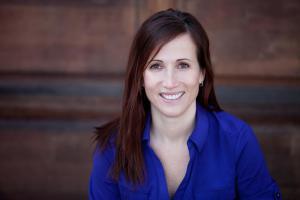
Jess Lourey
Liz and gang, Shannon and I are so happy to be here! We know that in much the same way that book groups are fronts for wine drinking and dirty joke-telling, cozy authors (and their books) may have sweet faces but in truth are rich in deviance, debauchery, and a wicked sense of humor. In honor of uncovering the truth, Shannon and I would like to talk about research today.
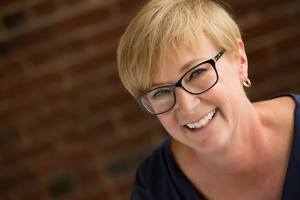
Shannon Baker
First, a little background. Shannon and I met around seven years ago at a writing conference. We were both published at Midnight Ink at the time, Shannon with her Tony Hillermann-esque Nora Abbott series, me with my little-bit-raunchy Murder by Month series, and we hit it off right away. We both like to drink and to laugh, preferably simultaneously (not a sport for the amateur). When we recently discovered that our thrillers had the same September 6 release date, Stripped Bare for her and Salem’s Cipher for me, we decided to embark on a 30-day Double Booked blog tour.
What in the name of the devil’s underpants were we thinking?
Turns out we were thinking smart things because touring together is a blast, even if 30 days is a long time. Shannon, speaking of blasts that take a long time, I know that Stripped Bare is set in the Nebraska Sandhills, which was your home for a while. Did setting your novel in a familiar landscape mean that you didn’t have to do much research?
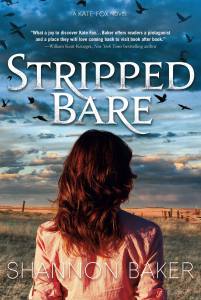 Shannon: Luckily, I have dear friends there who can fill me in on details I’ve forgotten or tip me about crazy goings on since I left. But I’m not in law enforcement so all that is research. The county sheriff where I lived is a great friend of mine and he’s on speed dial, so that helps. But here’s something that shocked me about Nebraska. Turns out, you don’t have to have any qualifications to be elected county sheriff. None. Zip. After election, you have 12 months to complete and pass an 8-week training at the police academy and until you do, you can’t perform anything you aren’t certified to do. Not even a traffic stop. So the state patrol and adjoining county sheriffs take care of official business in your county. Sounds like a criminal free-for-all, to me. Your new thriller has so many fascinating aspects, Jess. What kind of research did you dig up?
Shannon: Luckily, I have dear friends there who can fill me in on details I’ve forgotten or tip me about crazy goings on since I left. But I’m not in law enforcement so all that is research. The county sheriff where I lived is a great friend of mine and he’s on speed dial, so that helps. But here’s something that shocked me about Nebraska. Turns out, you don’t have to have any qualifications to be elected county sheriff. None. Zip. After election, you have 12 months to complete and pass an 8-week training at the police academy and until you do, you can’t perform anything you aren’t certified to do. Not even a traffic stop. So the state patrol and adjoining county sheriffs take care of official business in your county. Sounds like a criminal free-for-all, to me. Your new thriller has so many fascinating aspects, Jess. What kind of research did you dig up?
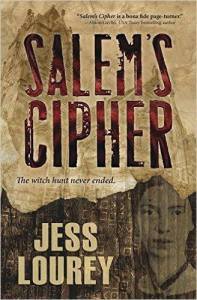 Jess here. I set the opening chapters of Salem’s Cipher in Minneapolis, where I live, because I love the city. It’s interesting, quirky, and underwritten in popular culture. I also set it here because I wanted to ground the novel in something familiar to me before it took off across the country as well as back in time. My protagonist, agoraphobic cryptanalyst Salem Wiley, is forced to leave the comfort of her apartment to embark on a cross-country race to save her mother as well as to save the first viable female presidential candidate in the history of the U.S.
Jess here. I set the opening chapters of Salem’s Cipher in Minneapolis, where I live, because I love the city. It’s interesting, quirky, and underwritten in popular culture. I also set it here because I wanted to ground the novel in something familiar to me before it took off across the country as well as back in time. My protagonist, agoraphobic cryptanalyst Salem Wiley, is forced to leave the comfort of her apartment to embark on a cross-country race to save her mother as well as to save the first viable female presidential candidate in the history of the U.S.
The story drove some of the places she had to travel to. For example, Emily Dickinson as well as those involved in the Salem Witch Trials of the 1600s play a role in the story, so it made sense that my character, Salem Wiley, would travel to Amherst and Salem, Massachusetts. I visited the city of Salem in February 2015 to do on-the-ground research, a process I love. It makes me feel like a real writer! Plus, it’s a tax write-off.
I’d been to Amherst before, and so called on those memories plus Google Earth. Same for San Francisco. When it came to writing realistically about West Virginia, though, an area that plays a crucial role in the book, I reached out to Facebook friends to help me with details, and boy did they come through: a sunset that cuts through air like ink, the sweet frog song that starts before moonrise, the earthy smell of manure laced with mountain mist. These are details I wouldn’t have found through traditional research. Shannon, have you ever rung up the Facebook hive to help you with your novel research?
Shannon: I live in Tucson now and it’s mid-April, with temps in the 80s and 90s. But Kate Fox is in Nebraska in mid-May, just before dawn, when it’s somewhere around 35 degrees. I asked FB: If a car had been driving 80mph for an hour and had been turned off for 45 minutes, would the hood still be warm? These details are important if you don’t want some hotheaded reader mailing anthrax to you. The answer is yes, though Amiee Hix felt compelled to talk about quantum mechanics. Some people. (Jess here—why is Aimee Hix so damn smart??? Like, math smart AND word smart.)
Below, please share with us your best research tip or leave a comment for a chance to win either a copy of Salem’s Cipher or a copy of Stripped Bare.
Wait! There’s more (no, not knives, you ninny):
If you order Salem’s Cipher before September 6, 2016, you are invited to forward your receipt to salemscipher@gmail.com to receive a Salem short story and to be automatically entered in a drawing to win a 50-book gift basket mailed to the winner’s home!
If you order Stripped Bare before September 6, 2016, you are invited to forward your receipt to katefoxstrippedbare@gmail.com to receive a Kate Fox short story and be entered for a book gift basket mailed to your home.
If you preorder both, you’re welcome to enter both contests as well as step to the front of the karma line.
Pop on over to the Writer Unboxed blog Monday as we share The Writing Tips We’d Be Naked Without, part of the Lourey/Baker Double Booked Tour.
Jess and Shannon – so awesome to have you guys on the blog. Best of luck with your new releases! Readers, did any of these research revelations surprise or inspire you?
Jessica (Jess) Lourey is best known for her critically-acclaimed Murder-by-Month mysteries, which have earned multiple starred reviews from Library Journal and Booklist, the latter calling her writing “a splendid mix of humor and suspense.” She is a tenured professor of creative writing and sociology, a recipient of The Loft’s 2014 Excellence in Teaching fellowship, and leads interactive writing workshops all over the world. Salem’s Cipher, the first in her thrilling Witch Hunt Series, hits stores September 2016. You can find out more at www.jessicalourey.com, or check her out on Facebook or Twitter.
Shannon Baker writes the Kate Fox mystery series. Stripped Bare, the first in the series, features a sheriff in rural Nebraska and has been called Longmire meets The Good Wife. Baker also writes the Nora Abbott Mystery Series, a fast-paced mix of murder, environmental issues and Hopi Indians published by Midnight Ink. Baker was voted Rocky Mountain Fiction Writers’ 2104 Writer of the Year. She writes from the Colorado Rockies to the Nebraska Sandhills, the peaks of Flagstaff and the deserts of Tucson. Her website is http://shannon-baker.com/.
Filed under: Guest posts Tagged: Jess Lourey, Kate Fox Mystery Series, Murder-by-Month Mysteries, research, Salem's Cipher, Shannon Baker

August 11, 2016
A Dog’s Life
By Liz, looking forward to a beach day or two this weekend!
I’m a huge Mary Oliver fan – have been since I read her poem “The Journey” years ago. I recently picked up her book Dog Songs, a collection celebrating her various pups and the bond she shares with them. The poems are sweet, simple, and moving, and wonderfully capture the essence of the beautiful canine soul. She and her dogs clearly love the beach – it’s mentioned in many of the pieces, like “School,” where her dog Percy wants to roll in a dead fish on the sand. She justifies this with, “It’s summer. How many summers does a little dog have?…This is our school.” Which led me to reflect on my own pups and their many adventures. Having celebrated Shaggy’s “Gotcha Day” in July and preparing for her 8th birthday in September, it seemed fitting to do a tribute to her and her brothers. So here’s a chronicle of their lives, their summers, and their own schooling. Enjoy.

Shaggy’s death row photo, South Carolina 2009, age 10 months

Her car ride home after her rescue

Finny at the farm after his rescue from South Carolina, age 1o months.
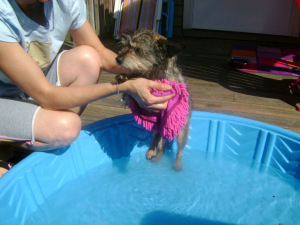
Giving Petey a bath after he arrived from the same South Carolina shelter as Shaggy

Her first toy

A bench break during a walk on the town green

Petey, not long after his S.C. rescue

Enjoying a car ride

Petey rolling

Owning the green

My calendar contest winning pic for Red Rover


Waiting patiently for someone to throw me the ball.

Celebrating her graduation from Canine Good Citizen class, 2015

Hugs

Loving summer on the deck!

Rolling

Shaggy’s favorite rock

Got the beach all to ourselves

The gang

I’m so tired I could sleep right on the floor.

Not sure I like this winter thing, Mom…

I like the summer way better!

Just chillin

Height!

Pretending to be a cat

Heading out on a boat ride

I love mud!

On my swing

Love

Favorite bedtime position
Readers, share stories of your favorite dogs in the comments!
Filed under: Liz's posts Tagged: a dog's life, dogs, Mary Oliver, poetry

August 10, 2016
Wicked Wednesday: Mythbusters IV–You Can’t Learn Voice
All writers have heard this–that voice in fiction is the one thing you can’t teach or coach or learn. Authors either have it or they don’t.
But is that true? If we define voice as “the embodiment in words of a distinct personality, style, or point of view,” we can readily see the difference in the hands of a master or a newbie taking their first tentative steps.
So Wickeds, is voice an inborn talent or can you learn it? How did you find, hone, and refine your voice? And for those who write multiple series, books, or stories, either simultaneously or serially, does each one have a distinct voice or are you always, at the end of the day, you?
 Edith: What great questions, Barb. I wouldn’t dare to say voice is a talent. As one of “those” who writes multiple series, I’m finding that if I know my protagonist well enough, and if I’m truly immersed in her setting, the distinct voice comes through. The voice in my Quaker Midwife series is completely informed by Rose being a Quaker, in 1888, an independent businesswoman, and a curious determined person. And when I write the Country Store mysteries, the voice comes out funnier and more southern. I’m working on a new series proposal now, and am fascinated by how the more I discover about my main character the more true the voice seems.
Edith: What great questions, Barb. I wouldn’t dare to say voice is a talent. As one of “those” who writes multiple series, I’m finding that if I know my protagonist well enough, and if I’m truly immersed in her setting, the distinct voice comes through. The voice in my Quaker Midwife series is completely informed by Rose being a Quaker, in 1888, an independent businesswoman, and a curious determined person. And when I write the Country Store mysteries, the voice comes out funnier and more southern. I’m working on a new series proposal now, and am fascinated by how the more I discover about my main character the more true the voice seems.
Julie: Interesting question! I think that there is a certain amount of talent in storytelling that helps set you apart. BUT, like any craft, writers get better with practice. I also think writers get braver with practice, and try out different voices.
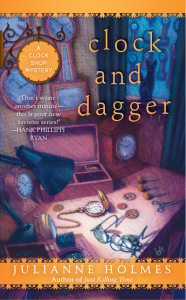 Jessie: This is a tough one! I like to believe everything can be improved in life so I hope voice can be learned or strengthened. We all have a lens on the world, it is just a matter of being willing to share it with a sort of unflinching verve. Perhaps it boils down to learning not to flinch, duck or pull punches.
Jessie: This is a tough one! I like to believe everything can be improved in life so I hope voice can be learned or strengthened. We all have a lens on the world, it is just a matter of being willing to share it with a sort of unflinching verve. Perhaps it boils down to learning not to flinch, duck or pull punches.
 Liz: This is a good one. I do believe everyone has their own voice – it’s a matter of finding it, understanding it and improving it over time. I agree too that a character’s voice is easier to hear and translate if you know that character well enough, as Edith mentioned. Talent is a part of that too, as is lots and lots of practice.
Liz: This is a good one. I do believe everyone has their own voice – it’s a matter of finding it, understanding it and improving it over time. I agree too that a character’s voice is easier to hear and translate if you know that character well enough, as Edith mentioned. Talent is a part of that too, as is lots and lots of practice.
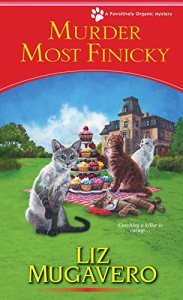 S
S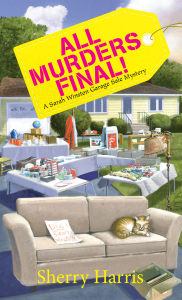 herry: Some of you know I have an unsold book series set in Seattle with a protagonist who is a gemologist. After it got a lot of rejections, I ended up sending it to a highly recommended editor (not one who reads or has been a guest on our blog). She gave me some homework before I sent the actual manuscript. When I finally sent the manuscript she sent it back and said it had no voice. She added that she knew I had a strong one from my emails and I needed to capture it to be successful. On the one hand I knew what she meant, on the other I was at a loss. Flash forward several years and I got the opportunity to write the proposal for the Sarah Winston books. The beginning poured out of me — I didn’t know Sarah at all, had never thought about her, never imagined a series with yard sales set in Massachusetts. So maybe you don’t have to know a character well to have a strong voice. But I do believe that practice and studying writing will develop stronger skills and make for a better story.
herry: Some of you know I have an unsold book series set in Seattle with a protagonist who is a gemologist. After it got a lot of rejections, I ended up sending it to a highly recommended editor (not one who reads or has been a guest on our blog). She gave me some homework before I sent the actual manuscript. When I finally sent the manuscript she sent it back and said it had no voice. She added that she knew I had a strong one from my emails and I needed to capture it to be successful. On the one hand I knew what she meant, on the other I was at a loss. Flash forward several years and I got the opportunity to write the proposal for the Sarah Winston books. The beginning poured out of me — I didn’t know Sarah at all, had never thought about her, never imagined a series with yard sales set in Massachusetts. So maybe you don’t have to know a character well to have a strong voice. But I do believe that practice and studying writing will develop stronger skills and make for a better story.
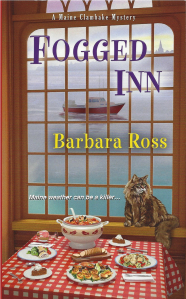 Barb: This is a hard one. I do believe there is a talent involved–some magical wiring in the brain that allows a writer to hear the rhythms of good prose and to, in turn, create it. Just as Good Will Hunting “sees” the answers to complex mathematical problems, or some people can pick up any instrument and pluck out tunes “by ear”, talented writers “hear” good prose. But that’s such a tiny part of being a good writer. My belief is that Voice = Confidence. The confident writer doesn’t flinch, as Jessie says. “Voice” is the sum and total of the storyteller whispering in the reader’s ear, “Come with me. I will take you on an amazing journey. You will see and hear things you’ll never forget. You’ll never regret it for a moment.” When the voice is strong, the reader absolutely believes it–from the first sentence. While for a tiny number of writers that exuberant belief in themselves is innate, most writers have to practice, practice, practice before they achieve that level of confidence.
Barb: This is a hard one. I do believe there is a talent involved–some magical wiring in the brain that allows a writer to hear the rhythms of good prose and to, in turn, create it. Just as Good Will Hunting “sees” the answers to complex mathematical problems, or some people can pick up any instrument and pluck out tunes “by ear”, talented writers “hear” good prose. But that’s such a tiny part of being a good writer. My belief is that Voice = Confidence. The confident writer doesn’t flinch, as Jessie says. “Voice” is the sum and total of the storyteller whispering in the reader’s ear, “Come with me. I will take you on an amazing journey. You will see and hear things you’ll never forget. You’ll never regret it for a moment.” When the voice is strong, the reader absolutely believes it–from the first sentence. While for a tiny number of writers that exuberant belief in themselves is innate, most writers have to practice, practice, practice before they achieve that level of confidence.
Readers: Do you believe voice is learned or innate? Which author’s/book’s/narrator’s voices do you love?
Save
Filed under: Wicked Wednesday Tagged: All Murders Final, Clock and Dagger, Delivering the Truth, fiction writing, Fogged inn, Murder Most Finicky, myth busting, voice, Whispers Beyond the Veil

August 9, 2016
A Wicked Wecolme to Debra Goldstein!
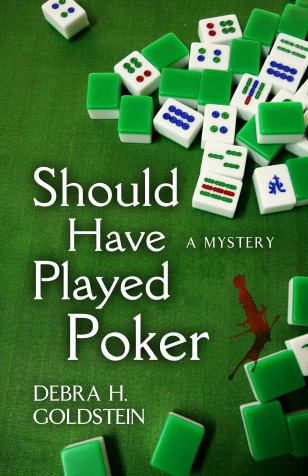 by Julie, enjoying the summer in Somerville
by Julie, enjoying the summer in Somerville
I met Debra Goldstein in person last year at Bouchercon. She moderated my first panel as a published author, a great conversation about point of view. She and I also serve on the board of Sisters in Crime together. Yesterday she invited me on her blog, It’s Not Always A Mystery. Today I’m thrilled that she is visiting the Wickeds. I hope you enjoy our interview.
Julie: From lawyer to judge to mystery writer—what an interesting career path you’ve had! Did one inform the other, or are they separate parts of your life?
Debra: Although all three careers incorporated my love of manipulating words to share ideas, the three have been otherwise completely separate. Entering college, I thought I would be a journalist. By the time I graduated three and one-half years later, my goals were to obtain a job in publishing and get on Jeopardy. During my job search, in case things didn’t work out, I applied to law schools. Eight months later, my goals accomplished, I decided to go to law school.
My first job post-law school was as a corporate international tax lawyer. Unfortunately, I hated it. Hoping to interact with and for people more, I became a labor litigator for the U.S. Department of Labor. I attribute my appointment as a federal Administrative Law Judge, twenty years younger than the average age of the job, directly to the writing and arguing skills I demonstrated in my cases, particularly an equal pay case of first impression. As a judge, my job involved knowing or researching the law, being fair when applying legal principles to a fact pattern, and articulating the basis of my decisions. Translated: my writing was rather boring.
Being the one who created the skits for parties and group 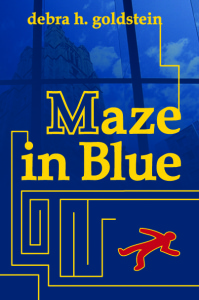 projects was the only time I wrote for fun until a friend dragged me to a writing conference. It offered several writing competitions and being the non-competitive person I am, I entered several of them the following year. I was hooked. Writing between midnight and four a.m. and on weekends became my release (luckily, my husband’s blood runs crimson and Nick Saban or G-d was leading the charge at Alabama). At first, I tried to keep the writing and judicial career separate, but when a defendant interrupted the end of the proceedings to tell me, “Your honor, no matter how you rule, I’ll buy your book,” I knew I had to make a choice. It was a no brainer – I picked my childhood dream of being a writer. A few of my stories and non-fiction pieces haven’t dealt with law related issues, but mystery usually works its way into my works
projects was the only time I wrote for fun until a friend dragged me to a writing conference. It offered several writing competitions and being the non-competitive person I am, I entered several of them the following year. I was hooked. Writing between midnight and four a.m. and on weekends became my release (luckily, my husband’s blood runs crimson and Nick Saban or G-d was leading the charge at Alabama). At first, I tried to keep the writing and judicial career separate, but when a defendant interrupted the end of the proceedings to tell me, “Your honor, no matter how you rule, I’ll buy your book,” I knew I had to make a choice. It was a no brainer – I picked my childhood dream of being a writer. A few of my stories and non-fiction pieces haven’t dealt with law related issues, but mystery usually works its way into my works
Julie: I’d love to hear about your journey being a writer. Were you always drawn to mysteries? Have you written in other genres?
Debra: During high school, I spent one summer writing plays for children’s theater, but I didn’t continue with this genre once I entered college. As my career progressed, I found myself constantly reading biographies or mysteries on airplanes or before bed. Consequently, when I decided to try my hand at writing, I wanted to write things that were like the easy fun reads I enjoyed at the beach, traveling, or just before I fell asleep. It is safe to say my 2012 IPPY Award winning book, Maze in Blue, a mystery set on the University of Michigan’s campus in the 1970’s, and my new book, Should Have Played Poker: a Carrie Martin and the Mah Jongg Players Mystery incorporate serious theme, but their primary goal is to be fun for readers. My published works also include literary and mystery short stories as well as non-fiction essays.
Julie: I love that you have a theater past–we need to talk about that more when we see each other at Bouchercon. I’d love you to tell us about Should Have Played Poker, especially your protagonist. It is quite the hook to get her sleuthing. Do you plan on this being a series?
Debra: In Should Have Played Poker, Carrie Martin’s precarious balancing of her corporate law job and visiting her father at the Sunshine Village retirement home is disrupted when twenty-six years after abandoning her. She leaves Carrie with a sealed envelope and the confession she once considered killing Carrie’s father. Before Carrie can obtain answers from her father, Carrie’s mother is murdered at the retirement home.
Although instructed by the detective assigned to the case, her former live-in lover, to leave the sleuthing to the police, Carrie is compelled to find out who killed her mother and why she reappeared in her life. As Carrie and her co-sleuths, the Sunshine Village Mah jongg players, attempt to unravel long hidden secrets, their efforts put Carrie in danger and show her that truth and integrity aren’t always what she was taught to believe.
My intention was for Should Have Played Poker to be the first in a series published by Five Star – a division of Cengage. Because Five Star will be ceasing its mystery line in mid-2017, future Carrie books are in limbo.
Julie: I hope they find a home, it’s a wonderful start to the series. How did you decide on setting and secondary characters? Is this a world you’re familiar with?
Debra: Having started as a corporate attorney, I was very familiar with that world and type of people who became the secondary business related characters. Because Carrie is dealing with issues that often are complex or serious, I knew I needed to add comic relief to the book. Thinking of where I was going to have Carrie’s father live, I realized the characters of Michael, his daughter, and the Mah jongg players who were featured in the first short story I ever sold, “Legal Magic,” would be perfect for Should Have Played Poker. So, I moved them, their retirement home, and the corporation to imaginary Wahoo, Alabama, which very much resembles an Alabama town I fell in love with during my book tour for Maze in Blue.
Julie: I love that! So many of our short stories come back and inspire us. We both serve on the board of Sisters in Crime. How has that organization influenced you?
Debra: Sisters in Crime opened doors for me. Whether a New York times bestseller or a fellow bottom of the food chain writer, everyone has been kind, considerate, and helpful in educating and supporting me. The friendships are something I treasure.
Julie: Shamelessly plug your new book, how we can get it, and tell us what you are working on now.
Should Have Played Poker: a Carrie Martin and the Mah Jongg Players Mystery is a fun read that you should grab if you are going to be on an airplane, at the beach, or like to read before bed. Both the hardcover and the e-book versions also are perfect gifts for mothers and mother-in-laws who play Mah Jongg or other games. The big box stores either have it in stock or can order it, numerous indies are carrying it, and it is available from all online sources. I’ve been a little lazy lately, but I have a new book in revision and will have some special short stories coming out in the near future. To find out planned signings and new works, please check my website, www.DebraHGoldstein.com or contact me through DHG@DebraHGoldstein.com .
Thanks for visiting us Debra! Readers, who plays Mah Jongg? I’ve always wanted to learn. Even more so now…
Debra Goldstein’s Bio:
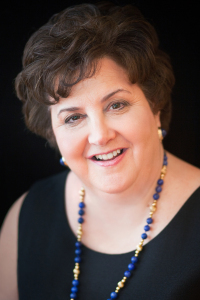 Judge Debra H. Goldstein is the author of Should Have Played Poker: a Carrie Martin and the Mah Jongg Players Mystery (Five Star Publishing – April 2016) and the 2012 IPPY Award winning Maze in Blue, a mystery set on the University of Michigan’s campus. Her short stories and essays have been published in numerous periodicals and anthologies, including Mardi Gras Murder and The Killer Wore Cranberry: a Fourth Meal of Mayhem. Debra serves on the national Sisters in Crime, Guppy Chapter and Alabama Writers Conclave boards and is a MWA member. Find her on Twitter at @DebraHGoldstein, on Facebook at https://www.facebook.com/DebraHGoldsteinAuthor/ and on her website, www.DebraHGoldstein.com.
Judge Debra H. Goldstein is the author of Should Have Played Poker: a Carrie Martin and the Mah Jongg Players Mystery (Five Star Publishing – April 2016) and the 2012 IPPY Award winning Maze in Blue, a mystery set on the University of Michigan’s campus. Her short stories and essays have been published in numerous periodicals and anthologies, including Mardi Gras Murder and The Killer Wore Cranberry: a Fourth Meal of Mayhem. Debra serves on the national Sisters in Crime, Guppy Chapter and Alabama Writers Conclave boards and is a MWA member. Find her on Twitter at @DebraHGoldstein, on Facebook at https://www.facebook.com/DebraHGoldsteinAuthor/ and on her website, www.DebraHGoldstein.com.
Filed under: Guest posts, Uncategorized Tagged: Blue Maze, Debra Goldstein, Should Have Played Poker


